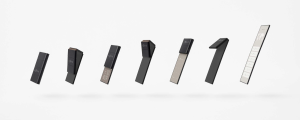
OPPO, a leading smart device company, showcased multiple new conceptual designs based on its human-centric design philosophy at the 4th China International Industrial Design Expo (CIIDE). These conceptual designs were created for OPPO by the leading Japanese design studio nendo, founded by Oki Sato. These result from the close collaboration between OPPO and nendo, exploring the possibilities of future design. During the exhibition, OPPO also exhibited a series of its classic product designs, showcasing its unique insights and exploration into form design, materials, and interaction that have occurred since the company’s inception.
The China International Industrial Design Expo is a national-level event focused on industrial design in China. With this year’s theme of “New Designs, New Trends, New Momentum,” OPPO put on a retrospective exposition, showcasing classic industry-leading product designs from throughout its history.
In 2008, OPPO launched its first smartphone, the “Smiley Face” A103, marking the beginning of its pursuit of the perfect synergy of ultimate aesthetics and innovation. These innovations have proved numerous over the past 12 years: In 2012, OPPO launched Finder – one of the world’s thinnest phones – designed to be easier and more comfortable for users to hold. In 2014, it introduced the 2.5D curved design on Find 5, while 2016’s R9 took inspiration from snow-covered mountain ridges to provide a smartphone with improved grip and looks. More recently, OPPO launched Reno3 in 2019 as the world’s thinnest 5G phone at the time.
OPPO’s breakthrough in design also extends to its cutting-edge camera technology. In 2014, OPPO released the world’s first motorized rotating camera smartphone –N3. In 2018, its full-screen display smartphone, Find X, utilized a pioneering sliding design which enabled the camera to pop out from within the phone when activated. This innovation integrated 11 components, including front and rear cameras and sensors, and resulted in a screen-to-body ratio of 93.8%. In 2019, OPPO broke even more boundaries with the launch of the Reno 10x Zoom and its unique pivot rising structure, which has since inspired new design ideas within the smartphone industry.
In November this year, OPPO once again demonstrated its latest exploration into mobile phone form factors with the OPPO X 2021 rollable conceptual handset at the OPPO INNO DAY 2020 event. The size of the conceptual device’s rollable display is infinitely adjustable within a specified range, offering a new perspective on the future of devices and how humans might interact with them.
At the China International Industrial Design Expo, OPPO showcased the “slide-phone” and “music-link” conceptual designs that it has been working on together with the leading Japanese industrial designing studio nendo. The idea for the “slide-phone” originated from OPPO and nendo’s discovery that smartphone users increasingly rely on their smartphones to interact with the world around them. To support more functionality, the smartphone is designed in a constant increase of size, making it difficult to hold and less convenient. This trend towards larger phones has become a growing concern for users. Armed with this insight, the “slide-phone” concept is designed with three foldable screens attached by hinges folding over in the same direction. By providing users with the flexibility to change the form of the phone as needed, users may benefit from the ability to change its size to suit the occasion. Furthermore, a stylus inserted in the phone allows users to expand their productivity by using the phone for work or other more complex tasks.
OPPO and nendo’s other conceptual design, “music-link”, is a collection of devices centered around a pair of TWS earphones that includes a smartwatch, an AI speaker, a portable charger, and a wireless charger. All devices are designed in a sleek organic form, adopting an affinity design that mirrors the aesthetic values of users today. When the TWS earphones and portable charging case are placed on the AI speaker, users can enjoy a seamless music experience transitioning from headphones to speaker. This symbiotic design between devices, and the emphasis on portability and convenience, reflects OPPO’s integration of technology and human-centricity in its design philosophy.
Commenting on the partnership, nendo CEO and chief designer, Oki Sato, said:“I was impressed by OPPO’s philosophy, which goes beyond leveraging the latest technology and pursues a comfortable relationship between people and their products through a human-centric approach to design. I am looking forward to seeing new concepts from the OPPO team as well as seeing how they manage to further strike a balance between technology and emotional engagement.”
OPPO Industrial Design lead designer Xiao Bo added: “nendo’s design is closely aligned with OPPO’s human-centric philosophy. OPPO aims to bring users a delightful product experience with cutting-edge technology and aesthetic design. This partnership is built upon a conviction that, to create a groundbreaking tech product with the right level of comfort for users, we must focus on “human.” Moving forward, we will double down on this approach by engineering products with a more seamless, user-friendly experience.”
As an explorer and leader pursuing the perfect synergy of ultimate aesthetics and innovation, OPPO established an industrial design center at its inception to incubate design and innovation within the industry. The center was certified by The Fourth selection of National Industrial Design Centers in China on November 22, 2019. OPPO’s cutting-edge product design has also been well-received and recognized by the industry. This year, OPPO Find X and Reno3 Pro won the 2020 Good Design Awards, while the OPPO Find X2 Pro won the Swan Award in the China Mobile Phone Design Competition. OPPO will continue to focus on product design, further exploring how technology and aesthetics can be integrated to create closer relationships between people, devices, and the world around them.










